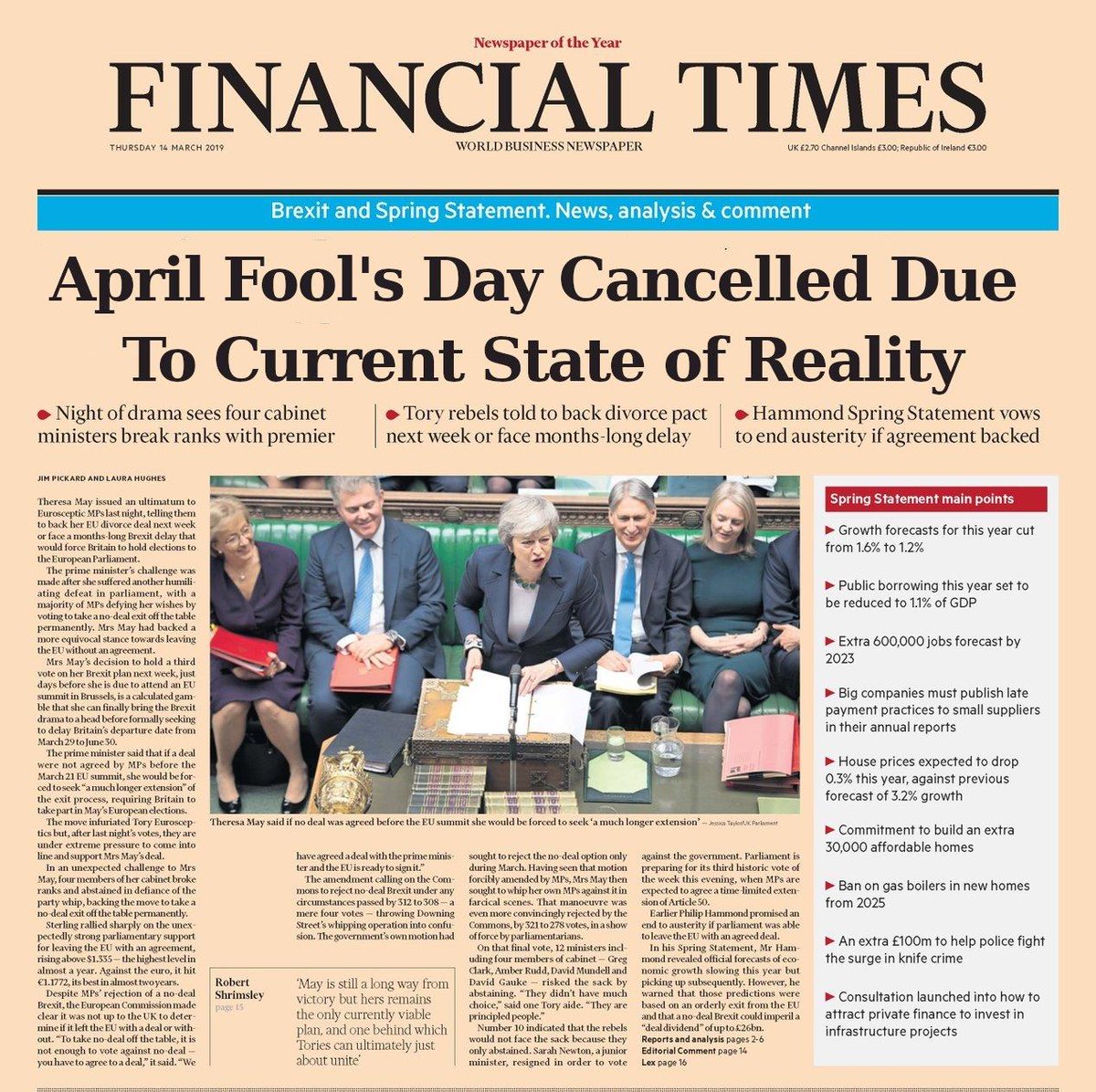Fig. 1: Front-page of the Financial Times (faked), dated 14/03/19. Headline reads “April Fool’s Day Cancelled Due to Current State of Reality“. Source: Alex Kokcharov on Twitter.
OK, so I realise posting basically anything on April 1st is a bit of a liability. This is not an April Fool’s Day trick, nor is it replete with Dad-jokey puns in the spirit of the (one-day) season. It’s rare that the Financial Times captures the spirit of my existential mood, but here we are: “April Fool’s Day Cancelled Due to Current State of Reality” (Fig. 1). Yes, it’s fake - but in current times, what’s nominally fake has the potential to be far more authentic than any elaborately staged “reality”. In case you hadn’t noticed, shit just got real, yo. Scratch that. Shit got real, is getting more real, and contemplation of the possible iteration of the realest - Brexit actually Brexiting, another 4 years of Trump in the USA, another hot minute of Tory devastation in the UK - is keeping me up at nights. Now more than ever, it’s time to do the work of building the world we want, we need, to live in.
The subject of this post, Premodern Transgressive Literatures is a very, very small drop in that hopeful bucket. It’s a book series conceived of as fundamentally political, intersectional and interdisciplinary, both in its ethos and practice. It showcases, and supports, scholars doing the important, challenging, messy work to change medieval studies from the inside out. This includes reinforcing the best parts of the Academy whilst simultaneously identifying and dismantling its worst infrastructure, ideological and otherwise. As Series Editor, I invite you to join our mission to re-shape academia, one transgressive publication at a time. Read on for the full run-down on the series, including the kinds of projects we are soliciting and how to get in touch to discuss publishing with us.
Series Abstract
Leiden, University Library, 583, printed work (16th century) with medieval fragments inside (12th century). Photo by Erik Kwakkel. (CC BY 4.0)
Premodern Transgressive Literatures takes a decisively political, intersectional, and interdisciplinary approach to medieval and early modern literature. The series supports scholarship which transgresses normative bounds along various axes. This includes the transgression of temporal boundaries which superficially separate the premodern era from our twenty-first century moment.
Premodern Transgressive Literatures takes a decisively political, intersectional, and interdisciplinary approach to medieval and early modern literature. The series supports scholarship which transgresses normative bounds along various axes. This includes the transgression of temporal boundaries which superficially separate the premodern era from our twenty-first century moment.
We aim to show, with insistent urgency, the ways in which the premodern can help us make sense of the modern, and the ways in which cutting-edge modern paradigms can help us better understand established, canonical premodern texts. This series is acutely aware of the role of the scholar in the production of history and the crucial importance of the context of scholarly work: the Academy, with its unique characteristics, both positive and negative. As such, Premodern Transgressive Literatures makes space for provocative discussion about the business of producing—and teaching—transgressive work in the neo-liberalized Academy.
Series Overview
Geographical Scope: Global, including but not limited to: Europe, the Mediterranean, Asia
Chronological Scope: Medieval and early modern world
Keywords: intersectionality, interdisciplinary, literature, culture, medieval, early modern, pedagogy
Editorial Board: Blake Gutt (University of Michigan), Carissa Harris (Temple University), Jonathan Hsy (George Washington University), Roberta Magnani (Swansea University), Elizabeth Robertson (University of Glasgow)
Authors: We welcome submissions from both established and early-career researchers.
Outputs: Monographs; collections of thematic essays; scholarly editions and translations with substantial introductions and apparatus.
Projects: We welcome projects in the series’ three principle strands: Transgressive Canon, Transgressive Texts and Approaches, and Transgressive Academy, as detailed below.
Series website: www.wmich.edu/medievalpublications/premodern-transgressive-literatures
Principle Strands of Scholarship
Transgressive Canon
Rethinking canonical, establishment authors and, where relevant, problematizing past approaches and assumptions. Projects in this strand deconstruct the canon from an “insider” position, one founded upon close attention to canonical texts and their authors. Volumes in this strand work to show both the richness of the material at hand, whilst also allowing for nontraditional and overlooked approaches with which to reconsider and reorient the canon itself.
We seek editors for the following volumes:
Transgressive Chaucer
Transgressive Gower
Transgressive Langland
Transgressive Arthur
Transgressive Tristan
Transgressive Marie de France
Transgressive Christine de Pizan
Transgressive Margery Kempe
Transgressive Readers
Transgressive Piety
NB. Transgressive Canon volumes require an overall Introduction (typically produced by the volume editor) summarizing, if briefly, the ways in which a given author, text, or key concept has been understood in scholarship historically. Volumes on a single canonical author adhere to a common skeletal structure, organized with 5 core sections as follows:
Author
Key Texts
Reader Reception
Manuscripts and Material Culture
Pedagogy (i.e., approaches to teach a given text or author).
2. Transgressive Texts and Approaches
Studies of subversive, understudied, and weird medieval texts are solicited here, drawing sustained attention to material which has otherwise been neglected, dismissed, or misunderstood. In parallel, this strand highlights innovations in methodological and theoretical approaches to premodern material, drawing out why such interventions are important and what they have to offer to today’s readers.
3. Transgressive Academy
Extended discussions of transgressive and progressive pedagogy and scholarship in the Academy, including—e.g., teaching practices to combat white supremacy, talking about sexual assault in the classroom, and innovative methods to inspire a new generation of scholars. We also embrace projects which speak openly about what it means to transgress the normative blueprint of a “typical academic”—i.e., those of us who do not look much like the “default” of a cis-het able-bodied white older man, and how that impacts our careers, our pedagogy, and our scholarship.


